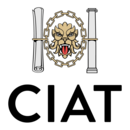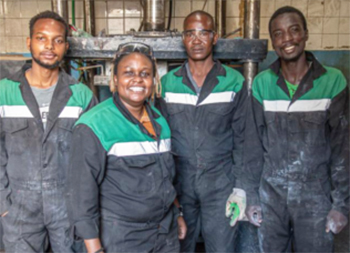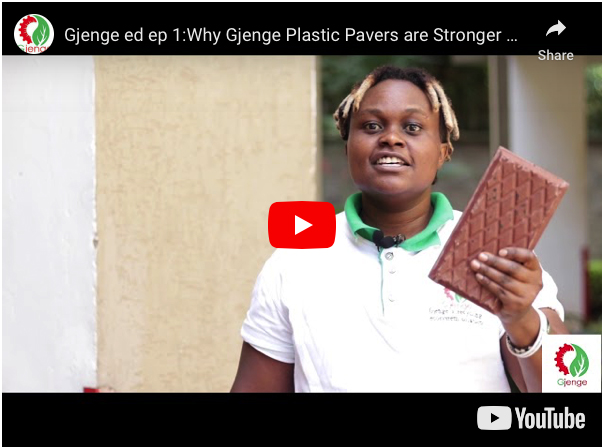Kenya recycles plastic bottles into bricks stronger than concrete
A 29-year-old Kenyan entrepreneur has created blocks out of waste plastic and sand that she claims are stronger, cheaper and more durable than concrete.
Nzambi Matee, a materials science graduate who got a scholarship to study the innovative admixture in the US, set up her slab-making workshop in her mother's back garden in Nairobi, and can produce 1,500 a day.
Her company, Gjenge Makers, has sold slabs to local schools and homeowners.
[edit] Flow-up update 2023
Gjenge is a community-oriented organization whose aim is to address the need for sustainable and affordable alternative construction materials in Kenya and the Continent. Our initial output is innovations derived from recycled plastics to produce paving blocks, paving tiles, and manhole covers.
Our team ideated a rollout of a plastics collection company that would sort and sell plastic waste to other recycling companies. Having collected more waste faster than the recycling companies could uptake, this original idea was pivoted, and a decision was made to do value addition to these plastics hence the decision to manufacture alternative building products emerged. Thus, Gjenge Makers was born.
Our mission is to innovate solutions to create beautiful and sustainable alternative construction products for Kenya and the African continent with the aim of providing sustainable and affordable alternative building materials whilst creating job opportunities for youths and women by promoting recycling and upcycling culture in Kenya and Africa.
We collect waste plastics and process it using the latest cutting-edge technologies to mix the recycled plastic with sand to form a mixture which we mold into our various products.
Gjenge Makers has cut a niche as a manufacturing trailblazer in the provision of beautiful and sustainable alternative building materials.
For further information visit https://www.gjenge.co.ke/about
[edit] Original GCR article 2021
The UN Environment Programme's (UNEP) named her 2020's Young Champion of the Earth in Africa.
Surprisingly, the plastic slabs are up to five times heavier than concrete ones owing to the lack of air pockets, but she says they are more flexible, durable and have a higher melting point.
The plastic pavers are 30% cheaper than traditional concrete ones, come in different colours and are certified by the Kenya Bureau of Standards.
Gjenge Makers offers three types of slabs: a light option for footpaths, a mid-tier paver for commercial projects and a heavy duty alternative for roads.
Matee has a material science degree and previously worked in Kenya's oil industry as an engineer, but quit to found Gjenge Makers. She obtained a scholarship to the University of Colorado Boulder to work on the ratios of sand to plastic in Gjenge Makers' bricks.
Nzambi Matee said to the UNEP: "Plastic is a material that is misused and misunderstood. The potential is enormous, but it's after life can be disastrous."
This article originally appeared on Global Construction Review. Images courtesy of Gjenge Makers. Republished on the CIAT news and blog site as "Kenyan start up recycles plastic bottles into bricks stronger than concrete" dated February 15 2021.
--CIAT
[edit] Related articles on Designing Buildings.
- Glass reinforced plastic GRP.
- Glass fibre reinforced plastic.
- Polycarbonate plastic.
- Plastic cladding.
- Plastic and recycling.
- Plastic coating market.
- Plastic in construction.
- Plastic in concrete.
- Recycled plastic bridges.
- Recycled waste plastic in construction.
- The K-briq a circular product.
- Types of plastic in construction.
- Wood plastic composites market for construction.
Featured articles and news
Scottish parents prioritise construction and apprenticeships
CIOB data released for Scottish Apprenticeship Week shows construction as top potential career path.
From a Green to a White Paper and the proposal of a General Safety Requirement for construction products.
Creativity, conservation and craft at Barley Studio. Book review.
The challenge as PFI agreements come to an end
How construction deals with inherited assets built under long-term contracts.
Skills plan for engineering and building services
Comprehensive industry report highlights persistent skills challenges across the sector.
Choosing the right design team for a D&B Contract
An architect explains the nature and needs of working within this common procurement route.
Statement from the Interim Chief Construction Advisor
Thouria Istephan; Architect and inquiry panel member outlines ongoing work, priorities and next steps.
The 2025 draft NPPF in brief with indicative responses
Local verses National and suitable verses sustainable: Consultation open for just over one week.
Increased vigilance on VAT Domestic Reverse Charge
HMRC bearing down with increasing force on construction consultant says.
Call for greater recognition of professional standards
Chartered bodies representing more than 1.5 million individuals have written to the UK Government.
Cutting carbon, cost and risk in estate management
Lessons from Cardiff Met’s “Halve the Half” initiative.
Inspiring the next generation to fulfil an electrified future
Technical Manager at ECA on the importance of engagement between industry and education.
Repairing historic stone and slate roofs
The need for a code of practice and technical advice note.
Environmental compliance; a checklist for 2026
Legislative changes, policy shifts, phased rollouts, and compliance updates to be aware of.























Comments
[edit] To make a comment about this article, or to suggest changes, click 'Add a comment' above. Separate your comments from any existing comments by inserting a horizontal line.